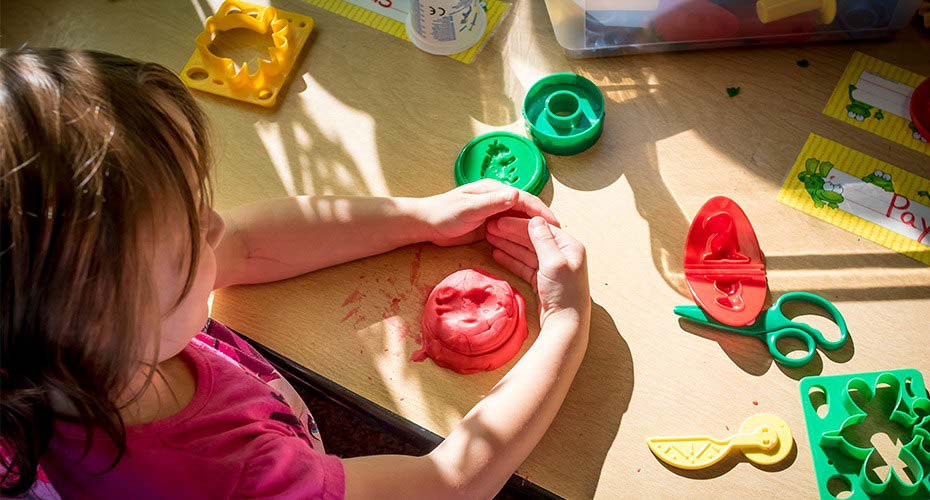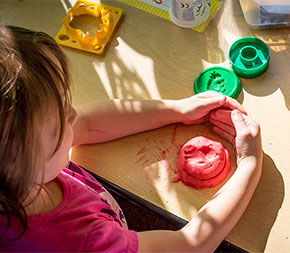Could You Excel in an Early Childhood Education Teacher Career?


Early childhood education careers will let you care for and teach children from infancy through age 8. Teaching young kids, you’ll find creative ways to help them learn the skills they need for their intellectual, emotional and physical development. Not only that, but the kids will make you laugh every day, and always keep you guessing.
Learn to Play, Play to Learn as an ECE Teacher
Early childhood teachers plan lessons are based on play and hands-on activities, the primary means through which young children learn. You will use games, music, artwork, films, books, and increasingly, computers.
Play may involve inspiring kids’ imagination and problem-solving through materials such as building blocks, clay or puzzles. It may also include group pastimes that promote social skills and cooperation, such as gardening, playing musical instruments or preparing a meal. Who knows? Maybe you’ll also have fun playing with, and learning from, them too.
Naturally, story time also plays an essential role in helping young children learn. You’ll provide time for students to listen to stories and explore books and other reading materials, and then give kids the opportunity to respond to a story or theme with rhyming games, art and crafts, and role playing.
How You’ll Succeed
To succeed in an early childhood education career, you must be patient, creative and love helping young children learn. You’ll need excellent communication skills, and must learn how to keep the attention of young children and the support of parents. You’ll delight in hearing your kids’ laughter, and seeing their happiness and-sometimes unexpected-development.
A career in early childhood education will give you the chance to teach kids when they are most open to learning. The play that children participate in today can lead them to years of success as students and adults. They will remember influential teachers and pivotal moments from their childhood for the rest of their lives.
ECE Teacher Career Growth
Most early childhood job openings will result from the need to replace the large number of teachers who are expected to retire soon, according to the U.S. Bureau of Labor Statistics (BLS). The BLS anticipates 109,000 new jobs to open up each year over the coming decade for kindergarten and early elementary teachers, and over 50,000 jobs each year for preschool teachers. This equates to a 3.4% job growth rate, on par with the national average for other career fields. With job opportunities on the horizon, qualified candidates may look forward to a promising career in early childhood education and spend their work day helping young children achieve their potential.
A career in early childhood education might have you working in these different kinds of institutions:
- Daycare centers
- Preschools
- Kindergartens
- Specialty schools, such as Montessori or religious schools
- Elementary schools
Within these settings, you may specialize in teaching the gifted or disabled, or in disadvantaged communities.
Bilingual education is also a growing need in early childhood education as our student base diversifies. Bilingual teachers, and those qualified to teach English as a second language, can increase their early childhood education career opportunities by utilizing their skills at schools that offer programs for non-English speaking students.
Opportunities in Early Childhood Education
With the increased focus on the value of early childhood education and the subsequent wave of new jobs, those qualified to teach young children can anticipate a broad range of career opportunities. Not only can they make a difference in the lifelong learning experiences of their students, but they can improve the quality and standards of the programs they teach-making the outlook and prospects even better for the next generation of teachers.
Candidates can enter careers in early childhood education from a variety of backgrounds, although an education degree and certification are the normal route. The advocacy group Pre-K Now recommends, at a minimum, certification, such as a child development associate (CDA), for teacher aides or those working with toddlers or preschool kids. A bachelor’s degree and state teacher certification are mandatory for those working with school-age children.
Not Just Entry Level: What to Do Next?
Teachers with advanced degrees and work experience in early childhood education might want to advance their careers in the following ways:
- Manage or own a daycare center
- Direct a group of daycare centers or preschools
- Work as public or private researchers
- Teach the next generation of early childhood educators
For more information on early childhood education studies, read our article on early childhood degrees.
Hours and Benefits
Because some preschools and child care centers operate year-round with extended hours to support working parents, a career in early childhood education may mean working a full-time schedule that includes summers. Schools and day-care centers often have staggered shifts to cover early morning and late pick-ups without having teachers work overtime.
As a benefit to teachers, a child care center, preschool or kindergarten may offer free or discounted tuition for their children. In addition, many jobs offer benefits packages that include vacation, insurance and other typical employee benefits. Be sure to inquire when you’re looking for the right teaching job for you.
The Big Payoff
The primary reward to a career in early childhood education is the chance to play a key role in a child’s life-to serve as a caring, responsive adult who offers attention, warmth and creativity, demonstrates how to communicate respectfully, and enthusiastically encourages individual accomplishments. Individuals who excel in early childhood education succeed in building positive relationships with children, helping them to feel valued, and creating a solid platform for their future learning experiences.
But what can you earn in the various roles? Take a look below for tips on improving your salary, and the best states to become an early childhood education teacher.
How Much Will My Early Childhood Education Salary Be?
You can compare median annual salaries and job growth for the state you live in below:
National data
Median Salary: $37,130
Projected job growth: 3.4%
10th Percentile: $28,200
25th Percentile: $30,810
75th Percentile: $46,500
90th Percentile: $60,900
Projected job growth: 3.4%
State data
| State | Median Salary | Bottom 10% | Top 10% |
|---|---|---|---|
| Alabama | $22,240 | $18,310 | $34,750 |
| Alaska | $37,010 | $30,300 | $78,540 |
| Arizona | $35,700 | $29,970 | $46,770 |
| Arkansas | $30,090 | $24,360 | $51,630 |
| California | $44,730 | $35,910 | $62,800 |
| Colorado | $44,970 | $35,380 | $81,400 |
| Connecticut | $38,600 | $31,060 | $77,000 |
| Delaware | $30,660 | $27,990 | $37,130 |
| District of Columbia | $49,030 | $38,910 | $112,330 |
| Florida | $30,900 | $24,920 | $45,920 |
| Georgia | $36,800 | $24,600 | $64,850 |
| Hawaii | $45,280 | $34,240 | $54,490 |
| Idaho | $28,440 | $21,350 | $48,250 |
| Illinois | $37,440 | $30,250 | $51,840 |
| Indiana | $33,850 | $27,450 | $44,140 |
| Iowa | $31,180 | $23,760 | $57,770 |
| Kansas | $43,260 | $27,190 | $61,560 |
| Kentucky | $33,940 | $23,680 | $61,480 |
| Louisiana | $36,640 | $21,450 | $59,830 |
| Maine | $42,780 | $31,840 | $54,120 |
| Maryland | $38,330 | $29,980 | $59,850 |
| Massachusetts | $44,410 | $36,490 | $59,770 |
| Michigan | $36,710 | $29,420 | $50,750 |
| Minnesota | $37,910 | $31,850 | $58,720 |
| Mississippi | $26,720 | $18,720 | $44,500 |
| Missouri | $35,480 | $28,060 | $50,720 |
| Montana | $34,770 | $25,920 | $48,190 |
| Nebraska | $49,910 | $27,110 | $71,940 |
| Nevada | $34,940 | $24,650 | $59,310 |
| New Hampshire | $37,650 | $30,810 | $49,230 |
| New Jersey | $39,490 | $29,960 | $78,610 |
| New Mexico | $33,180 | $25,360 | $52,350 |
| New York | $43,460 | $32,240 | $73,310 |
| North Carolina | $33,990 | $24,120 | $45,010 |
| North Dakota | $39,250 | $34,760 | $56,660 |
| Ohio | $33,770 | $27,100 | $47,770 |
| Oklahoma | $32,460 | $22,500 | $57,160 |
| Oregon | $38,220 | $31,070 | $57,800 |
| Pennsylvania | $35,170 | $24,250 | $48,410 |
| Rhode Island | $38,980 | $27,640 | $61,270 |
| South Carolina | $33,870 | $24,140 | $61,420 |
| South Dakota | $30,990 | $27,550 | $48,920 |
| Tennessee | $35,500 | $26,320 | $61,970 |
| Texas | $35,070 | $24,050 | $64,710 |
| Utah | $33,220 | $24,430 | $45,390 |
| Vermont | $38,560 | $32,180 | $60,850 |
| Virginia | $37,820 | $28,480 | $63,980 |
| Washington | $42,960 | $35,820 | $53,610 |
| West Virginia | $31,150 | $22,130 | $60,750 |
| Wisconsin | $34,870 | $27,530 | $44,620 |
| Wyoming | $30,790 | $23,470 | $48,730 |
Source: U.S. Bureau of Labor Statistics (BLS) 2023 median salary; projected job growth through 2032. Actual salaries vary depending on location, level of education, years of experience, work environment, and other factors. Salaries may differ even more for those who are self-employed or work part time.
The Path to Higher Wages
The normal career path in early childhood education will generally follow an upward path of promotions. If you enter the industry on the ground level, you might start as an assistant teacher and improve your salary after you become a teacher, and then a lead teacher. Eventually, with more education and experience, you can advance to the role of director of a school or center. With greater responsibilities come greater financial rewards.
While finding an early childhood education job in a different city or state can offer you higher pay, you may not want to relocate. The now concluded Pre-K Now project suggests that teachers can also improve their wages with additional education or specialized training. Teachers sometimes begin their careers in a preschool with an associate’s degree in early childhood education. Those who hold bachelor’s degrees generally qualify to teach kindergarten through third grade. Teaching a higher-grade level typically results in a higher salary. Getting a master’s degree or adding another endorsement onto your resume will also help, and may also open up more job opportunities.
Career Opportunities in Early Childhood Education
With the increased focus on the value of early childhood education and the subsequent wave of new jobs, those qualified to teach young children can anticipate a broad range of career opportunities. Not only can they make a difference in the lifelong learning experiences of their students but they can positively influence the quality and standards of the programs they teach-making the outlook and prospects even better for the next generation of teachers.
Early Childhood Education Teacher Certification and School Accreditation
Each state has its own requirements for early childhood education teacher certification (also called teacher licensure), and schools teaching young children must be accredited by a governing body.
Before deciding on a school for your early childhood education training, you should check with your state Department of Education (DOE) to find out what its teacher certification requirements are.
General Requirements
Teacher certification is granted by each state’s Department of Education. Many states require, or will be requiring, certification of all individuals teaching in public school early childhood programs. Early childhood education teacher licensing is even more important as we all want to ensure the safety of our young children.
Licensing requirements for preschool teachers vary by state. Some states require a bachelor’s degree in early childhood education, while others require an associate’s degree, and still others require certification by a nationally recognized authority. Teacher certification for kindergarten teachers also varies by state. However, all states require teachers to have obtained at least a bachelor’s degree and to have completed an approved teacher training program. Supervised student teaching is also a requirement.
The Child Development Associate (CDA) credential is the most common type of national certification for child care providers. It is often required to work in day care centers, nursery schools or preschools, with an emphasis on either Infants and Toddlers, or Preschool-aged children. See the Council for Professional Recognition website for more details on teacher certification for early childhood education.
Early Childhood Education School Accreditation
Accreditation is a process by which organizations certify the competency of schools to teach in a given field. The accreditation process ensures that schools are competent to teach, test and certify their students.
There are many advantages for choosing an accredited early childhood education program:
- Assurance of a quality education
- National or regional accreditation assures students that an institution of higher education adheres to high quality standards based on the latest research and professional practices.
- Qualify for financial aid opportunities
- Accreditation by a national or regional accrediting body also allows students to participate in federally funded and state financial aid programs. In order to receive federal funds, an institution must be accredited by a national or regional accrediting body recognized by The U.S. Department of Education (DOE). All Education Schools only lists schools accredited by a recognized accrediting body.
- Earn a more marketable degree
- Attending an accredited teacher-education school can also make you more competitive in the job market; some employers will accept degrees only from a regionally accredited institution when considering promotions or salary.



